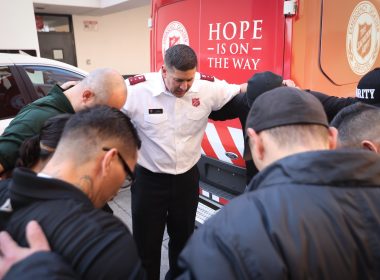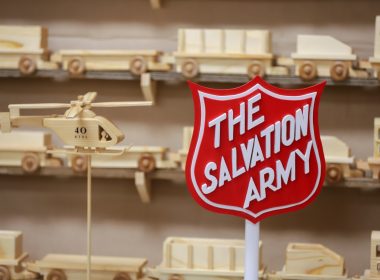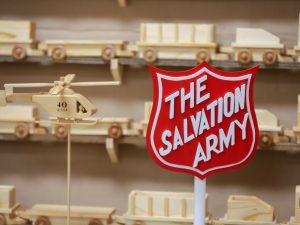A brief look at a Salvation Army program you may not know about.
by Georgia Tzanidis –
What is SATERN?
No, it is not a misspelling of the planet Saturn!
Salvation Army Team Emergency Radio Network (SATERN) is a group of amateur radio operators willing to provide emergency communications support for Salvation Army operations in local, regional, national and international disaster and emergency situations. Major Patrick McPherson, now its international director, developed SATERN in the late 1980s. The idea stemmed from his desire to create an amateur radio presence for The Salvation Army. The program originated out of the Central Territory and currently has a presence in all 50 states and Canada, as well as many other parts of the world.
SATERN’s primary purpose is to be available at a moment’s notice to relay messages during a disaster. Such a service is essential, particularly during widespread devastation, where communication lines are often completely wiped out. For instance, during Hurricane Andrew, it played a crucial part in linking the public with missing friends and family. With the help of SATERN, people are able to get information about their loved ones, as well as to assist in the coordination of disaster services.
Recent training
SATERN held its 13th annual seminar in January. Amateur radio operators (HAMs) met at The Salvation Army San Bernardino Corps for specialized training. Over 100 SATERN operators and friends participated in six hours of training. Topics included, “How best to work with media during a disaster” and “What the future holds for communications based on new research.” Suzi Woodruff Lacey, public relations director for the Sierra del Mar Division, and Jay H. Jones, Ph.D., from the University of La Verne, were among the presenters. A highlight was the Willette family donation of radio equipment in memory of Edward Willette. Captain Stephen Ball, San Bernadino corps officer, received the gift on behalf of The Salvation Army. Ball then presented the Willette family with a plaque in appreciation of their donation.
Remembering Al Shaver
The SATERN community recently lost one of its exemplary representatives, Al Shaver. Shaver was a retired United Airlines senior captain who saw a notice about a Salvation Army disaster services seminar while living in Hawaii. He and his wife, Anne, became aggressive advocates for the SATERN program and were founders and editors of the newsletter The SATERN Ring. Shaver and McPherson became good friends, and Shaver played a pivotal role in introducing McPherson and SATERN to the world of the Internet.
In a recent email to his fellow team members, McPherson said the following about his friend and SATERN comrade: “Primarily I remember a man, motivated, and willing to help out the people in this world, who was a great force for The Salvation Army and truly representative of the potential God gives us.”
Relevant in today’s world
Just over 20 years have passed, but The Salvation Army Team Emergency Radio Network is just as relevant today as when it was created—perhaps even more so. Because of a changing world, we are now faced with new kinds of disasters—those brought on by man—not even conceivable in the past. From New York City’s Ground Zero to Hurricane Katrina, SATERN has provided essential radio communication services in countless situations under varying circumstances. It is reassuring to know that they will continue to be there for years to come.
For more information visit www.qso.com/satern.











